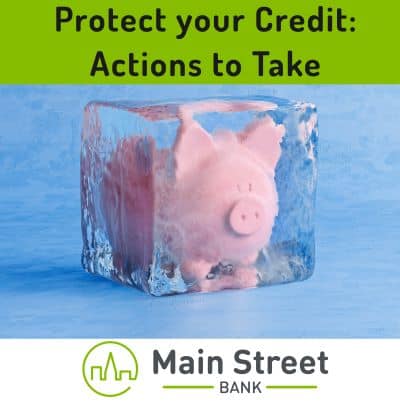Protecting your credit is an important way to protect your identity. There are many ways that your identity can be compromised, including through breaches of data, theft, or online malfeasance. Fortunately, there are tools at your disposal that can help make it more difficult for fraud to occur. Utilizing these tools can help secure your accounts if you had issues with identity theft in the past, as well as help prevent future occurrences.
Act quickly if you suspect that your identity has been compromised. Visit our identity theft recovery page for more information about what to do if your identity has been stolen.
There are three main ways that you can protect and monitor your credit accounts to protect against identity thieves:
- Monitor your credit by downloading your free credit report annually.
- Set up a fraud alert to better protect your accounts.
- A credit freeze offers the strongest protection against fraud.
Read on to learn which of these actions is right for you.
Credit Freeze
A credit freeze completely blocks out unwanted accounts from being opened in your name. It prevents access to your credit reports, stopping fraud in its tracks. This freeze can be reversed or temporarily lifted by you any time, so that when you want to open an account, you can. A credit freeze is like a lock that you place on your credit, keeping your credit report away from anyone else. You can unlock it when needed.
Credit freezes are a very strong tool to protect your accounts, and they take time and effort to set up. To set up a credit freeze, you need to contact each of the three credit bureaus independently. These three bureaus are Equifax, Experian, and TransUnion. Each bureau will set up their own credit freezes.
Setting up credit freezes takes time, and it can be a pain to manually contact the credit bureaus whenever you need to open an account. But that extra effort is a very strong defense against identity theft. If you are concerned about identity theft or are a victim already, then a credit freeze is the right route to prevent fraud. Credit freezes are set in place for an indefinite period, so it’s up to you to manually disable them when you no longer need the protection.
Fraud Alerts
A fraud alert, also known as a security alert, is a status on your credit report where businesses must contact you before opening accounts under your name. Unlike a credit freeze, fraud alerts don’t restrict outside access to your credit report, and as such, they are less restrictive than credit freezes.
Anyone who suspects fraud can place a fraud alert. To set up a fraud alert you only need to contact one of the three credit bureaus. They will then notify the other two bureaus to set up a fraud alert on your behalf. Fraud alerts are easier to set up than credit freezes, but they are still a great tool for preventing fraud. It’s important to note that fraud alerts expire after one year, but they can be renewed before their expiration.
Extended Fraud Alerts
An extended fraud alert can be considered if you’ve had your identity stolen. They offer long-term protection against identity theft. Extended fraud alerts are a special status that is only available to those who have had their identity stolen. (And have completed an identity theft report at identitytheft.gov or filed a police report.) Extended fraud alerts are much like regular fraud alerts, but they last for seven years instead of one. In addition to their extended duration, credit bureaus also take you off their marketing list for unsolicited credit and insurance offers for five years unless you request otherwise.
Credit Reports
Your credit reports are important documents that contain information about your credit activity and current credit situation. Monitoring your credit reports periodically helps you stay on top of your current credit situation and can help you catch fraudulent activity or delinquent accounts.
You are entitled to a free credit report every 12 months from each of the three major consumer credit bureaus (Equifax, Experian, and TransUnion. Request a free copy from AnnualCreditReport.com, or call 877-322-8228. You can request all three reports at once, or separately at different times. If you choose to request them separately then you can take advantage of these free reports to monitor your credit throughout the year.
Bank Security Tools
Using the tools that your bank has available is another way to help protect your identity. Utilizing online banking and setting limits and alerts on cards helps you spot fraudulent transactions quickly. Developing the habit of frequently review recent account activity can help you spot fraud before it’s too late. Notify your bank immediately if you suspect that your identity has been stolen.
While using credit freezes may add a few extra steps to protecting your information, it’s better than the alternative – cleaning up your credit after your identity has been stolen. In this case, prevention is better than cure.
Main Street Bank offers free Credit Score, available in the consumer Main Street Bank Mobile Banking app. Credit Score gives you free access to your up-to-date credit score, allows you to monitor your credit and even submit disputes on your credit report.
Closing
In summary, credit freezes and fraud alerts can help you to protect you from identity theft. Or, if you are already a victim, they can also help you to prevent further damage. They take some effort to set up, but they can allow you peace of mind and greater security over your credit. Your options are:
- Credit freeze (most effective, but requires the most steps.)
- Fraud alert (less effective, but requires less steps.)
- Free credit reports (doesn’t prevent identity theft but can give you insight, can be done in conjunction with a freeze or alert.)
- Regularly monitoring your existing credit card and bank accounts for transactions you don’t recognize.
Sources
- https://consumer.ftc.gov/articles/what-know-about-credit-freezes-fraud-alerts
- https://consumer.ftc.gov/consumer-alerts/2022/02/credit-freeze-or-fraud-alert-right-you
- https://consumer.ftc.gov/consumer-alerts/2020/02/fraud-alerts-credit-freezes-whats-difference
- https://www.consumerfinance.gov/ask-cfpb/what-is-a-credit-report-en-309/
- https://www.consumerfinance.gov/ask-cfpb/how-do-i-get-a-copy-of-my-credit-reports-en-5/
Follow us on social media for more fraud prevention content.


